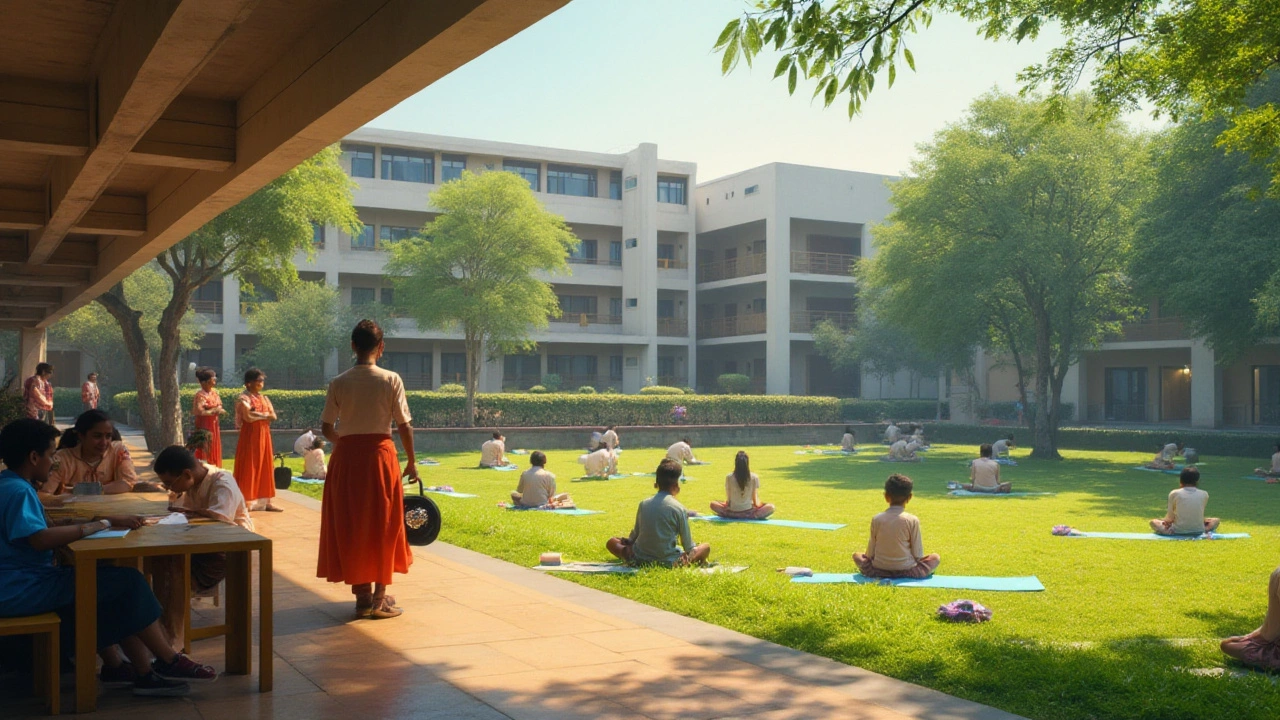Deciding on an educational board for your child can feel like standing at a crossroads in a dense forest without a map. The CBSE board has carved out a significant space in India's educational system, providing a path that countless families have found enriching and promising. With its structured syllabus and emphasis on holistic development, CBSE is often the go-to choice for many parents.
But how does one decide if it is indeed the right fit for their child? Understanding the nuances of the CBSE syllabus might just hold the key to unlocking your child's potential. As you ponder over this crucial decision, let us explore the benefits, challenges, and unique offerings of the CBSE board that could impact your child's future.
- Understanding the CBSE Syllabus
- Advantages of Choosing CBSE
- Comparison with Other Boards
- Tips for Transitioning to CBSE
- Long-term Benefits of CBSE Education
Understanding the CBSE Syllabus
When we delve into the universe of education boards in India, the Central Board of Secondary Education, commonly known as CBSE, consistently stands out as a superior choice for many. Its approach is both comprehensive and straightforward, designed to make learning an accessible and enjoyable journey for students. The board's structure targets a harmonious balance between theoretical and practical knowledge, which seeks to prepare children not just for exams, but for life itself. The curriculum is periodically updated to accommodate new developments in science, humanities, and technology, ensuring it stays relevant in today's fast-evolving global landscape.
One of the key aspects of the CBSE board is that it adopts a very systematic format. The detailed syllabus provides a clear pathway from foundational to advanced concepts, making it easier for both students and teachers to understand the expectations at each stage. English, Mathematics, Science, and Social Science form the pillars of CBSE's core subjects. The syllabus is designed to facilitate cognitive and analytical skill development, catering to various learning styles. This adaptability can be a major boon for children as it provides multiple ways to engage with the content and grasp complex topics. Anecdotal evidence from teachers often highlights how the CBSE's gradual progression method benefits students in building a strong knowledge base.
In terms of specific known facts, the CBSE syllabus emphasizes continuous and comprehensive evaluation (CCE), which was introduced to move away from rote learning and instead focus on a child's overall growth. This system incorporates assignments, projects, and periodic tests, ensuring that students remain engaged throughout the academic year. The syllabus also weaves in life skills sessions and co-curricular activities, allowing students to nurture talents beyond textbooks. It is worth noting that the board actively encourages participation in sports and arts, fostering a well-rounded educational experience. As per Dr. Sarvepalli Radhakrishnan's vision, "Education is meant not only to provide skills for earning but also to make better human beings." This spirit lies at the heart of CBSE's educational ethos.
Another noteworthy aspect is CBSE's alignment with national entrance examinations like JEE and NEET. This alignment helps students who aim to crack these exams by offering them a curriculum closely aligned with their preparation needs. Consequently, many parents believe that the CBSE board lays down a solid groundwork for higher education paths in India. For non-Indian readers, it's important to acknowledge how universally recognized CBSE is, with many foreign universities accepting CBSE grades as part of their application process.
Moreover, the textbook content crafted by the National Council of Educational Research and Training (NCERT) under CBSE supervision is known for its clarity, simplicity, and focus on conceptual knowledge. These textbooks serve as an important resource for students and teachers alike. With an enriching blend of textual content, illustrations, and exercises, CBSE textbooks aim to expand a learner's horizon every academic year. Schools affiliated with CBSE are spread across India and abroad, offering students a platform to receive an education that fits them into a global education community. This widespread acceptance is a testament to the syllabus's effectiveness and its benefits to students of diverse cultural backgrounds.
The CBSE curriculum encourages a spirit of inquiry and innovation which is crucial in tackling tomorrow's challenges, according to the National Education Policy 2020.
In summary, understanding the CBSE syllabus means recognizing the board's commitment to blending academic success with essential life skills. With their continual updates and incorporation of contemporary issues, CBSE provides avenues for students to become not just well-educated, but also socially conscious individuals. Understanding its framework and its rich offerings can indeed help parents and students make informed decisions about their educational journey.
Advantages of Choosing CBSE
When parents are faced with the daunting task of selecting the right educational path for their child, the CBSE board often emerges as a compelling choice. Rooted in a rich history of fostering academic excellence and holistic development, the CBSE board is renowned for its carefully curated syllabus that balances traditional knowledge with modern approaches. One of the standout features of the CBSE curriculum is its nationwide recognition, making academic transitions smoother across different regions of India. As a national-level board, CBSE ensures uniform education across its schools, providing a seamless and coherent learning experience for students. This uniformity is a boon for parents whose professions require frequent relocations, as it minimizes the disruptions in a child's education.
The emphasis on comprehensive, activity-based learning sets CBSE apart from numerous other educational boards. Students are encouraged not just to memorize facts but to delve deep into subjects, understand concepts, and apply their knowledge to real-life situations. This method of teaching nurtures critical thinking skills and ignites a curiosity-driven approach towards education. The CBSE board's commitment to incorporating contemporary teaching aids, digital resources, and interactive sessions into the curriculum further enriches the learning environment. By focusing on skill-based learning, the CBSE syllabus prepares students effectively for competitive exams like the JEE and NEET, which are crucial for higher education.
Nita Ambani once remarked, "The true purpose of education is not just to impart knowledge, but to inspire young minds to think critically and act bravely." The CBSE curriculum embodies this belief, aiming to inspire future leaders of tomorrow.
Another advantage of the CBSE board is its inclusive approach to education. It provides an array of co-curricular activities alongside academics, ensuring a balanced development for students. This comprehensive focus helps in nurturing not merely academic achievers but well-rounded individuals equipped with essential life skills. The incorporation of physical education, arts, and other extracurricular pursuits into the curriculum helps children discover their talents and passions, promoting a vibrant school life. Parents often appreciate the structured yet flexible examination system of the CBSE board, which assesses students through periodic tests, assignments, and project work. This diversity in evaluation methods lessens the pressure of final examinations and supports consistent academic growth.
In recent years, CBSE has also made significant strides in incorporating 21st-century skills into its core curriculum. Technology integration within classrooms and the frequent updating of study materials ensure that students are in tune with global educational standards. Life skills, communication, and leadership are emphasized, ensuring the student is not just academically proficient but also socially responsible and adaptable to an ever-evolving world. A noteworthy stat is that in the year 2023, about 20.3 million students were enrolled under the CBSE board, indicative of the trust and preference it holds among Indian parents when it comes to quality education.
A report by the Institute of Education Sciences highlighted that "curriculums which integrate modern skills with traditional subjects better prepare students for future challenges." This insight resonates strongly with parental choices favoring CBSE for their child's educational journey.
Choosing the CBSE board can hence be a conscious move towards securing a robust and balanced academic foundation. The emphasis on standardized quality education, combined with opportunities in sports, arts, science, and beyond, makes CBSE a versatile option. Parents can rest assured that their child's development is being catered to in a holistic fashion, grooming them to become global citizens who are confident and capable of facing future challenges head-on. Whether their aspirations lie in entering prestigious technological institutes or exploring diverse career paths, a CBSE education promises to be a solid stepping stone.

Comparison with Other Boards
Choosing the right educational board involves not just a choice but an understanding of what each board offers, how it aligns with parental and student expectations, and what future avenues it opens. The CBSE board is renowned for its comprehensive curriculum, which emphasizes theoretical learning complemented by practical application. In juxtaposition to other educational boards like ICSE, IB, and State Boards, the careful distinctions of CBSE become particularly prominent.
Starting with the ICSE board, it is known for its advanced curriculum that often delves deeper into English language studies and offers expansive options in arts and commerce. While CBSE focuses on a balance, especially favoring STEM subjects, ICSE might cater more to those children whose interests lean towards language and arts. This can significantly influence a child's comfort and performance in early years. The world-recognized IB board, on the other hand, offers a different paradigm by promoting international-mindedness and critical thinking through its program, which might be more suitable for expatriate families or students aiming to pursue higher education abroad. The CBSE board retains its pull through its uniformity and standardization across a large number of schools, creating seamless transitions across states for families who move frequently due to job relocations.
The State Boards, while serving local education standards well, maintain syllabuses that could highly vary from one state to another. This factor might provide deeper cultural and linguistic studies relevant to each state but could also place challenges for students shifting from one state to another. CBSE shines here with its standardized content and examination patterns. A notable fact: entrance exams for prime Indian institutions such as the IITs and AIIMS are based on the CBSE syllabus. A significant number of students from CBSE backgrounds find themselves at ease with these competitive exams, giving them a perceived advantage.
There are numerous stories from parents delighted with the straightforwardness of the CBSE board. A report by Education World suggests that "84% of parents found the CBSE curriculum to align with their expectations of academic rigor and discipline." Each board presents its bouquet of benefits and considerations. The ultimate decision often rests on a family's educational philosophy, child’s learning style, and future plans. A deep dive into each board helps to assess where your child might thrive most.
Tips for Transitioning to CBSE
Embarking on a new educational journey with the CBSE board can be both exciting and daunting for parents and children alike. This transition may require adjustments in study habits, routines, or even mindsets, depending on the previous educational experiences. As the CBSE curriculum often introduces a structured approach with a focus on comprehensive understanding, it's essential to prepare the child and the family environment to embrace this shift. Parents can begin by setting a realistic and gradual pace to ease the transition. Offering support and encouragement enables children to see this change as an opportunity for growth rather than a challenge to be feared. Exploring the new subjects together, discussing expectations, and encouraging curiosity can make the transition smoother and more enjoyable.
Understanding the teaching methodologies and examination formats is crucial in the smooth transition to CBSE. The board often emphasizes critical thinking skills and application-based learning rather than rote memorization. By familiarizing children with CBSE's unique approach to exams—where application of knowledge and creativity is often valued over straightforward answers—parents can help alleviate some of the initial exam stress. Creating a conducive learning environment at home is another critical aspect. Equip children with the necessary tools, whether it's access to textbooks, online resources, or CBSE-focused guides. Implementing a daily study routine that aligns with the CBSE schedule can enhance a child's comfort with the new curriculum.
"Education is the most powerful weapon which you can use to change the world," said Nelson Mandela. Embracing this philosophy can empower students to approach their new CBSE journey with confidence and curiosity.Engaging in regular communication with teachers is a valuable strategy. CBSE educators often have insights into a student's strengths and areas that may need improvement. Regular updates from teachers can guide parents in providing the necessary support and encouragement at home. Utilize teacher interactions as a platform to understand the curriculum intricacies, work on ongoing assignments, and even discover new learning patterns that could benefit the child.
Social integration should also be a focus during this transition phase. Helping children build friendships within the CBSE environment can offer emotional support and foster a sense of belonging. Encourage participation in school activities, clubs, and sports to provide an enriching experience beyond the classroom. The CBSE board offers various extracurricular options, allowing students to explore diverse interests and develop essential life skills. Involving children in such activities promotes teamwork, leadership, and personal growth. Lastly, it's essential to maintain flexibility and patience throughout this transition. Adjustments may take time, and setbacks can occur, but consistent support and understanding can pave the way for a fulfilling CBSE experience.

Long-term Benefits of CBSE Education
When contemplating the long-term benefits of a CBSE education, one should consider how the board has meticulously structured its curriculum to foster both academic and personal growth. The CBSE board is renowned for its uniform and coherent syllabus that adheres closely to the needs and demands of modern education standards. This uniformity is particularly advantageous for students who might relocate across different states within India, as the curriculum remains consistent, thus minimizing disruptions in the learning process. This continuity can significantly reduce stress and acclimatization time for children and parents, facilitating a seamless transition in their educational journey.
A noteworthy benefit of the CBSE system is its forward-thinking approach that seamlessly aligns with numerous competitive exams such as JEE and NEET, often the gateways to prestigious engineering and medical programs in India. The coursework is designed to build a foundational knowledge that is critical for these entrance examinations. By familiarizing students early on with the question patterns, time management, and problem-solving techniques required, CBSE bolsters a student's confidence and readiness. In support of this, a study revealed that approximately 75% of the candidates who clear these exams have a background in CBSE, indicating the board's strategic alignment with higher education standards and success rates.
CBSE's emphasis isn't solely on rote learning but also on understanding concepts deeply through application-based learning. By integrating experiments within science syllabi and assigning project work across subjects, the board encourages students to uncover creative solutions, promoting innovation and critical thinking skills. This approach not only aids in academic excellence but also prepares students for real-life challenges and opportunities. The inclusion of life skills, environmental education, and values in the curriculum cultivates a well-rounded personality.
"The CBSE board has a vision that stretches beyond textbooks to real-world applications," remarks Dr. Suresh Nayak, an educational researcher. "It nurtures problem-solvers who are ready to tackle the challenges of tomorrow," he adds, emphasizing the practical relevance of CBSE's teaching methodologies.
Additionally, CBSE offers a plethora of co-curricular activities that foster skills beyond the classroom. These activities range from sports and arts to advanced mathematics clubs and robotics, providing multiple avenues for students to explore and enhance different aspects of their personalities. Collaborative learning through group activities and inter-school competitions is encouraged, promoting teamwork, sportsmanship, and social skills, crucial for personal and professional life.
Competitive edge in the global education landscape is another arena where a CBSE education shines. With its comprehensive syllabus and focus on standardized evaluation, students transitioning to international curriculums or universities abroad find themselves well-prepared to meet global standards. The English language competency, scientific approach, and mathematical aptitude fostered through CBSE make integration into foreign educational environments smoother for students aiming for international careers.
To help parents make an informed decision, here's an interesting tidbit: Over a decade, CBSE has consistently updated its syllabus in response to technological advancements and in collaboration with educational experts, ensuring that students are abreast of the latest knowledge and skills required in various fields, including digital literacy.
